Events
Upcoming Event
Statistics and Data Science Seminar: "Neural Collapse in AI Training"
Department of Statistics and Data Science
11:00 AM
//
Ruan Conference Room – lower level, Chambers Hall
Details
Neural Collapse in AI Training
X.Y. Han, Assistant Professor of Operations Management, Booth School of Business, University of Chicago
Abstract: In the performance-dominated landscape of AI development, systematic understanding is difficult: Any architecture is fair game as long as it can climb the leaderboard. Yet, even among the overwhelming multiformity of neural networks, one motif remains: data is transformed layer-by-layer and iteration-by-iteration into high-dimensional representations with which predictions are eventually made. Thus, examining the geometry of these representations offers a powerful lens for the analysis of AI. Neural Collapse is a striking example, evident late in the training of predictive AI: Originally observed in classification networks during a 'Terminal Phase of Training' (TPT) – where training error vanishes but loss continues decreasing – Neural Collapse reveals a fundamental inductive bias. It encompasses four interconnected geometric regularities in the final layer representations: (NC1) Within-class variability of activations collapses towards zero as they converge to their class means; (NC2) These class means arrange themselves into a maximally separated, symmetric structure (a Simplex Equiangular Tight Frame); (NC3) The classifier vectors align with these class means in a self-dual configuration; (NC4) The model's decision mechanism effectively simplifies to Nearest Class-Center rule. This emergent geometric simplicity is linked to improved generalization, robustness, and interpretability. I will discuss the core Neural Collapse phenomenon, its theoretical underpinnings, and recent updates and extensions since its discovery.
Time
Friday, April 25, 2025 at 11:00 AM - 12:00 PM
Location
Ruan Conference Room – lower level, Chambers Hall Map
Contact
Calendar
Department of Statistics and Data Science
NUTC Seminar Series| "Investigating Vulnerabilities in Autonomous Vehicle Perception Algorithms" - Saif Eddin Jabar, NYU
Northwestern University Transportation Center
4:00 PM
//
Ruan Conference Center, Chambers Hall
Details
Abstract
Autonomous vehicles (AVs) rely on deep neural networks (DNNs) for critical tasks such as environment perception—identifying traffic signs, pedestrians, and lane markings—and executing control decisions like braking, acceleration, and lane changing. However, DNNs are vulnerable to adversarial attacks, including structured perturbations to inputs and misleading training samples that can degrade performance. This presentation begins with an overview of adversarial training, emphasizing the impact of input sizes on DNNs' vulnerability to cyberattacks. Subsequently, I will share our recent findings that explore the hypothesis that DNNs learn piecewise linear relationships between inputs and outputs. This conjecture is crucial for developing both adversarial attacks and defense strategies in machine learning security. The last part of the presentation will focus on recent work on using error-correcting codes to safeguard DNN-based classifiers.
Bio
Saif Jabari is a Global Network Associate Professor of Civil and Urban Engineering at New York University. His research interests center on theoretical aspects of traffic flow, specifically topics related to modeling uncertainty and emergent phenomena. The applications focus on traffic operations problems, including traffic state estimation and prediction, distributed traffic control, and cybersecurity.
Prior to joining NYUAD, Jabari was a Post-Doctoral Researcher in the Mathematical Sciences and Analytics Department at the IBM T.J. Watson Research Center in Yorktown Heights, NY. Jabari received his Ph.D. in Civil Engineering from the University of Minnesota, Twin Cities in 2012 and his B.Sc. degree in Civil Engineering from in the University of Jordan in 2001.
Time
Thursday, April 24, 2025 at 4:00 PM - 5:00 PM
Location
Ruan Conference Center, Chambers Hall Map
Contact
Calendar
Northwestern University Transportation Center
Using Copilot Chat and Generative AI Tools on Your Terms
Northwestern IT Teaching and Learning Technologies
12:00 PM
Details
Learn how to access and use Copilot chat and the questions to know to engage with generative AI on your terms.
Time
Friday, April 25, 2025 at 12:00 PM - 1:00 PM
Calendar
Northwestern IT Teaching and Learning Technologies
SoC I EPICS: Alumni Career Conversation - Creative AI
SOC - Office of External Programs, Internships, & Career Services (EPICS)
12:00 PM
//
2-378, Frances Searle Building
Details
Adam Rowings (Theatre ‘07, Kellogg ’11) will discuss how past technological changes have created waves of new opportunities especially for those early in their careers and how the current developments in AI will spark similar opportunities for enterprising new grads.
Time
Monday, April 28, 2025 at 12:00 PM - 1:00 PM
Location
2-378, Frances Searle Building Map
Contact
Calendar
SOC - Office of External Programs, Internships, & Career Services (EPICS)
Generative AI for Language Instruction: Copilot for Student Assignments
Language Resource Center
3:30 PM
//
2530, Kresge Hall
Details
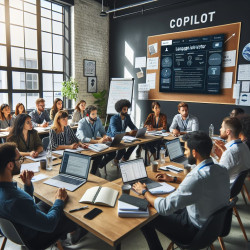
The Media and Design Studio and Language Resource Center are pleased to offer a hands-on workshop on the use of Microsoft Copilot. This workshop expands on examples presented in a fall quarter seminar series by allowing participants to directly interact with various recommended generative artificial intelligence ("Gen AI") tools.
Participants will learn how to use AI to develop lesson plans and materials and to create and shape various forms of multimedia for teaching use.
Time
Monday, April 28, 2025 at 3:30 PM - 4:30 PM
Location
2530, Kresge Hall Map
Contact
Calendar
Language Resource Center
Grace: An Innovative Theater Experience
Department of Computer Science (CS)
5:00 PM
//
The Garage, North Campus Parking Garage/Academic Building
Details
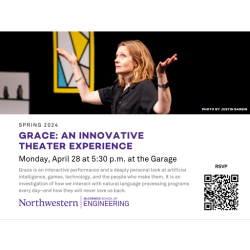
Grace is an interactive performance and a deeply personal look at artificial intelligence, games, technology, and the people who make them. It is an investigation of how we interact with natural language processing programs every day-and how they will never love us back.
The performance of “Grace” will be followed by comments from a faculty panel and an audience discussion. Light refreshments will be offered starting at 5 pm.
Time
Monday, April 28, 2025 at 5:00 PM - 6:30 PM
Location
The Garage, North Campus Parking Garage/Academic Building Map
Contact
Calendar
Department of Computer Science (CS)
New Developments in the Theory and Methodology of Graph Neural Networks
NSF-Simons National Institute for Theory and Mathematics in Biology
9:00 AM
//
Suite 3500
Details
Graph Neural Networks (GNNs) are a recent extension of the neural network machinery to the graph setting that resolve the challenge of extending deep learning methods the peculiarities of network data by convolving node features across neighbourhoods to embed nodes in Euclidean space. Heralded as the breakthrough for machine learning on graphs that would allow the same “AI renaissance” that standard neural networks have brought to Computer Vision and Natural Language Processing, GNNs have been suggested as a panacea for a wide number of tasks across disciplines. In the biological sciences alone, GNNs have been applied to molecular design, drug-drug interaction predictions, biological networks, knowledge graphs, and spatial transcriptomics.
Despite their popularity and widespread adoption, the theoretical foundations of GNNs remain underexplored. Fundamental questions about the mathematical principles driving their success, as well as their limitations, biases, and underlying statistical assumptions, are still unresolved. Notably, GNNs diverge significantly from traditional neural networks, with their architecture and function rooted in the unique properties of graph-structured data. These gaps in understanding could have significant implications in real-world applications, where issues revolving around bias and uncertainty must be rigorously addressed.
This workshop seeks to bring together researchers from statistics, computer science and computational biology to explore the theoretical and practical aspects of GNNs. The workshop will focus on topics revolving around three key themes:
• GNN Theory: Investigating foundational topics such as learning rates for classification and regression tasks, understanding the impact of different GNN architectures and the convolution operator.
• Uncertainty Quantification & Interpretability: Understanding the confidence and robustness of GNN predictions.
• Bias and Fairness: Exploring how GNNs may inadvertently propagate or amplify biases and ensuring equitable outcomes in their applications.
This two-day workshop will feature a series of focused deep-dive sessions, each dedicated to a core topic. These sessions will integrate expert talks with interactive discussions and structured brainstorming activities, led by small groups of participants, to foster collaboration and innovative thinking. The anticipated outcome of each session is the formulation of a precise research question and the initial framework of a research plan, providing participants with the opportunity to continue working on these topics beyond the workshop. The workshop's overarching goal is to produce a collaborative white paper that synthesizes the discussions, highlights key open questions, and outlines promising research directions in the theory and applications of Graph Neural Networks (GNNs).
Time
Tuesday, April 29, 2025 at 9:00 AM - 5:00 PM
Location
Suite 3500
Contact
Calendar
NSF-Simons National Institute for Theory and Mathematics in Biology
New Developments in the Theory and Methodology of Graph Neural Networks
NSF-Simons National Institute for Theory and Mathematics in Biology
9:00 AM
//
Suite 3500
Details
Graph Neural Networks (GNNs) are a recent extension of the neural network machinery to the graph setting that resolve the challenge of extending deep learning methods the peculiarities of network data by convolving node features across neighbourhoods to embed nodes in Euclidean space. Heralded as the breakthrough for machine learning on graphs that would allow the same “AI renaissance” that standard neural networks have brought to Computer Vision and Natural Language Processing, GNNs have been suggested as a panacea for a wide number of tasks across disciplines. In the biological sciences alone, GNNs have been applied to molecular design, drug-drug interaction predictions, biological networks, knowledge graphs, and spatial transcriptomics.
Despite their popularity and widespread adoption, the theoretical foundations of GNNs remain underexplored. Fundamental questions about the mathematical principles driving their success, as well as their limitations, biases, and underlying statistical assumptions, are still unresolved. Notably, GNNs diverge significantly from traditional neural networks, with their architecture and function rooted in the unique properties of graph-structured data. These gaps in understanding could have significant implications in real-world applications, where issues revolving around bias and uncertainty must be rigorously addressed.
This workshop seeks to bring together researchers from statistics, computer science and computational biology to explore the theoretical and practical aspects of GNNs. The workshop will focus on topics revolving around three key themes:
• GNN Theory: Investigating foundational topics such as learning rates for classification and regression tasks, understanding the impact of different GNN architectures and the convolution operator.
• Uncertainty Quantification & Interpretability: Understanding the confidence and robustness of GNN predictions.
• Bias and Fairness: Exploring how GNNs may inadvertently propagate or amplify biases and ensuring equitable outcomes in their applications.
This two-day workshop will feature a series of focused deep-dive sessions, each dedicated to a core topic. These sessions will integrate expert talks with interactive discussions and structured brainstorming activities, led by small groups of participants, to foster collaboration and innovative thinking. The anticipated outcome of each session is the formulation of a precise research question and the initial framework of a research plan, providing participants with the opportunity to continue working on these topics beyond the workshop. The workshop's overarching goal is to produce a collaborative white paper that synthesizes the discussions, highlights key open questions, and outlines promising research directions in the theory and applications of Graph Neural Networks (GNNs).
Time
Wednesday, April 30, 2025 at 9:00 AM - 5:00 PM
Location
Suite 3500
Contact
Calendar
NSF-Simons National Institute for Theory and Mathematics in Biology
McCormick MS Program Fair
Office of Professional Education (OPE)
11:00 AM
//
Main Entrance, Technological Institute
Details
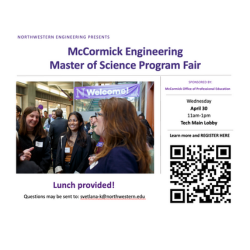
Please join us for a casual fair to learn about grad school opportunities here at Northwestern!
Admissions teams and other program faculty and staff will be there to share information and answer questions. We will have materials to hand out and will be open to speaking one-on-one and looking at resumes. You are welcome to join whether you know which program interests you or you’d just like to learn more about the possibilities!
Lunch will be provided. We look forward to seeing you there!
The Master of Science programs featured:
- Master of Science in Biotechnology (MBP)
- Master of Science in Machine Learning and Data Science (MLDS)
- Master of Science in Artificial Intelligence (MSAI)
- Master of Science in Project Management (MPM)
- Master of Science in Robotics (MSR)
- Master of Science in Engineering Design Innovation (EDI)
- Master of Science in Theoretical and Applied Mechanics (TAM)
- Master of Science in Mechanical Engineering
- Master of Science in Material Science and Engineering
- Master of Science in Computer Engineering
- Master of Science in Computer Science
- Master of Science in Electrical Engineering
- Master of Science in Biomedical Engineering
- Master of Science in Chemical and Biological Engineering
- Master of Science in Energy and Sustainability (MSES)
- Master of Science in Law Program
Time
Wednesday, April 30, 2025 at 11:00 AM - 1:00 PM
Location
Main Entrance, Technological Institute Map
Contact
Calendar
Office of Professional Education (OPE)
SLIPPAGE: 2025 3D Humanities Series
SLIPPAGE: Performance | Culture | Technology
5:00 PM
//
226, John J. Louis Hall
Details
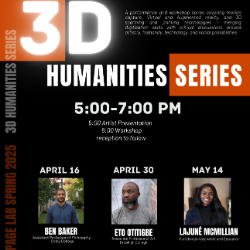
The Slippage: 3D Humanities Series aims to nurture the formation of an interdisciplinary learning community that critically engages the connections between performance, history, theater, and emerging technologies. The 3-part performance and workshop series is designed to expose Northwestern University audiences to professional artists with technology-enhanced practices, and to provide participants with the skills and on-campus resources that enable innovative humanities research. Each event will pair a performance and discussion led by a technology-focused professional performance artist, with a hands-on skills-based workshop led by Northwestern University faculty or staff. The workshops will allow participants to engage technologies such as: motion capture, 3D digitization and printing, artificial intelligence and mechatronics – merging technological skill sets with critical discussions around artistry, humanity, and social possibilities.
Artists:
April 16 - Ben Baker, Assistant Professor of Philosophy at Colby College
April 30- Eto Otitigbe, Assistant Professor of Art at Brooklyn College
May 14- LaJuné McMillian, Multidisciplinary Artist and Educator
Join us from 5:00-7:00PM on any or all of the dates for these innovative programs:
Introduction: 5:00 - 5:10PM
Presentation: 5:10 - 5:30PM
Moderated Q&A: 5:30 - 5:50PM
Break: 5:50 - 6:00PM
Workshop: 6:00 - 7:00PM
Group Reflection: 7:00 - 7:30PM
Reception 7:30-8:30PM
Workshop Leaders: Thomas F. DeFrantz, Ted Quiballo, Craig Stevens, Michael A. Peshkin, Nick Marchuk, Darren Gergle
Series Convenors: Thomas F. DeFrantz (SLIPPAGE Lab/Performance Studies), Craig Stevens (Northwestern IT: Media & Technology Innovation/Anthropology), Ted Quiballo (Northwestern Libraries)
Sponsors: The Alice Kaplan Institute for the Humanities; The Alumnae of Northwestern University; Northwestern Libraries; Northwestern Depts. of IT and Performance Studies; and SLIPPAGE Lab.
Time
Wednesday, April 30, 2025 at 5:00 PM - 8:30 PM
Location
226, John J. Louis Hall Map
Contact
Calendar
SLIPPAGE: Performance | Culture | Technology
NUTC Seminar Series | "Uncertainty in the Vulnerability of Metro Transit Networks: A Global Perspective - Nazanin Tajik, Mississippi State University
Northwestern University Transportation Center
4:00 PM
//
Ruan Conference Room, Chambers Hall
Details
Nazanin Morshedlou (Tajik), Ph.D., is an Assistant Professor in the Department of Industrial and Systems Engineering at Mississippi State University. She received her B.S. from the Sharif University of Technology, her M.S. from the University of Tehran, and her Ph.D. from the University of Oklahoma (OU). At OU, she was a graduate research assistant in the Risk-Based Systems Analytics Laboratory.
At MSU, she has established a cross-disciplinary, inter-university research center that integrates Artificial Intelligence (AI) tools, Machine Learning (ML), and Social Science (SS) concepts. Her goal is to form a problem-solving framework applicable to a wide variety of research thrusts, from cyber-physical-social infrastructure resilience to search and rescue planning, and from smart transportation to game-theoretic robotic designs.
Her publications have appeared in journals as Transportation Research Part B, IEEE Systems, International Journal of Production Economics, and Journal of Infrastructure Systems. She is a member of the Institute for Operations Research and Management Science (INFORMS), Institute of Industrial and Systems Engineering (ISE), Production and Operations Management Society (POMS).
Time
Thursday, May 1, 2025 at 4:00 PM - 5:00 PM
Location
Ruan Conference Room, Chambers Hall Map
Contact
Calendar
Northwestern University Transportation Center
Buffett First Friday Lunch: Computationally Accessible Law: On Bringing the French & U.S. Tax Systems Out of the Past & Into the Future
Buffett Institute for Global Affairs
12:30 PM
//
Second floor, 720 University Place
Details
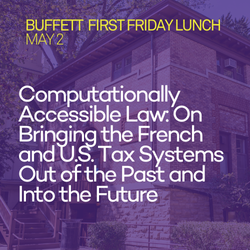
Join the Buffett Institute for a faculty research lunchtime talk series on the first Friday of every month. Faculty members give a half-hour talk intended for a broad, multidisciplinary audience of Northwestern students, faculty and staff, followed by a conversational Q&A. Lunch is provided beginning at 12:15 p.m.
Tax law is complicated for humans, because it contains complex, interlocking, computational-heavy rules. But what is hard for humans can be easy for computers. And indeed, both France and the United States depend on computers and algorithms to implement tax and benefits law. Both countries, however, use outmoded computational approaches to tax administration. This talk will describe a joint project of French and U.S. researchers to create a new programming language, designed specifically for implementing tax and benefits law. The talk will also describe how the project has created its culture and norms to permit computer scientists and technologists to use technology to actually improve the administration of government, in particular by respecting, depending on, and working closely with subject-matter experts.
Please note that 720 University Place is not an ADA-accessible space. Increasing physical access to buildings and facilities is a goal of the University, but not all buildings and venues have been updated.
Time
Friday, May 2, 2025 at 12:30 PM - 1:45 PM
Location
Second floor, 720 University Place Map
Contact
Calendar
Buffett Institute for Global Affairs
AI for Research: Computer Vision with OpenCV (Chicago)
Northwestern IT Research Computing and Data Services
12:00 PM
//
421, Wieboldt Hall North Entrance
Details
OpenCV, short for Open Source Computer Vision Library, is an open-source computer vision and machine learning software library. In this workshop you will learn how to work with image or video data, choose the right image processing filters for your research task, and create OpenCV pipelines to detect image features of interest, or classify images.
Prerequisites: None
Time
Monday, May 5, 2025 at 12:00 PM - 1:30 PM
Location
421, Wieboldt Hall North Entrance Map
Contact
Calendar
Northwestern IT Research Computing and Data Services
James E. Dobson - "Neural Network Computing Before GPUs"
Science in Human Culture Program - Klopsteg Lecture Series
4:30 PM
//
Hagstrum 201, University Hall
Details
Speaker
James E. Dobson - English, Dartmouth College
Title
"Neural Network Computing Before GPUs"
Abstract
High-speed, high-memory, multicore graphics processing units such as those sold by Nvidia Corporation are the dominant enabling technology for contemporary deep learning. These specialized computing devices offload mathematically complex operations from general purpose CPUs. While these devices seemingly appear as novel technologies designed for the generative AI age, they have been around for decades as part of the development of computer graphics and visual computing, a history recounted in Jacob Gaboury’s recent Image Objects: An Archaeology of Computer Graphics. This talk places today’s latest GPUs in a parallel genealogy, that of the more than seventy-year-old search for alternatives to general purpose digital computers based on neural network architectures. That project runs through the development of early learning machines including Frank Rosenblatt’s Perceptron and Tobermory to Hopfield network-inspired systems in the 1980s and 1990s such as the massively parallel high-performance computers produced by nCUBE, MasPar, and Thinking Machines. Despite these developments and the success of contemporary technologies, the tendency in computing has been toward simulation and general-purpose computers. In tracking the material history of specialized processors alongside today’s popular artificial neural network architectures, we may better understand their interrelation and the prospects for the continued relevance of these devices.
Biography
James E. Dobson is associate professor of English and creative writing, director of the Institute for Writing and Rhetoric, and special adviser to the provost for AI at Dartmouth College. He is author of The Birth of the Computer Vision (2022) and Critical Digital Humanities: The Search for a Methodology (2019), among others, and is coauthor of a forthcoming creative and biographical reading of machine-learning researcher Frank Rosenblatt titled Perceptron.
Time
Monday, May 5, 2025 at 4:30 PM - 6:00 PM
Location
Hagstrum 201, University Hall Map
Contact
Calendar
Science in Human Culture Program - Klopsteg Lecture Series
Next Steps in R: Introduction to Text Analysis (Virtual)
Northwestern IT Research Computing and Data Services
12:00 PM
Details
This workshop introduces text processing and analysis using the quanteda package in R. We will learn how to parse and tokenize text, set it up for analysis, and prepare it to be used for natural language processing (NLP).
Prerequisites: Participants should be familiar with R at the level of the R Fundamentals Bootcamp, another introductory R workshop, or be a self-taught R coder.
Time
Tuesday, May 6, 2025 at 12:00 PM - 1:00 PM
Contact
Calendar
Northwestern IT Research Computing and Data Services
Industry Technical Workshop: "How AI is Moving Freight"
Northwestern University Transportation Center
2:00 PM
Details

Six early-stage AI companies — Augment, Fleetworks, GenLogs, HappyRobot, Qued and Vooma —are coming together with the Northwestern University Transportation Center at the Spring 2025 Industry Technical Workshop to show “how AI is moving freight.”
The Workshop will explore the growing role and potential of AI in automating communication, streamlining workflows, and improving overall efficiency in logistics management. The panelists will discuss actual applications of how AI-powered automation is improving task efficiency, reducing operational costs, enhancing service reliability, and potentially reshaping the industry.
Workshop Agenda
WEDNESDAY, MAY 7, 2025
2:00 PM Welcome / Opening Remarks
Hani Mahmassani | Director | NUTC
Bret Johnson | Sr. Associate Director | NUTC
2:10 PM Presentations
Harish Abbott, Founder, Augment LLC
Jesse Buckingham, Co-Founder, Vooma
Kris Forrest, Head of Sales, GenLogs
Prasad Gollapalli, CEO and Chairman, Qued
Pablo Palafox, Co-founder & CEO, HappyRobot Inc.
Paul Singer, Co-founder & CEO, FleetWorks
3:15 PM Networking Break
3:45 PM Panel Discussion
Moderator - John Larkin, Strategic Advisor & Chair of Advisory Board, Clarendo Capital LLC
4:45 PM End of Program
Time
Wednesday, May 7, 2025 at 2:00 PM - 4:45 PM
Location
Contact
Calendar
Northwestern University Transportation Center
BMG Seminar: Hani Goodarzi, PhD, UCSF
Biochemistry & Molecular Genetics Seminar Series
10:00 AM
//
Simpson Querrey Auditorium, Simpson Querrey Biomedical Research Center
Details
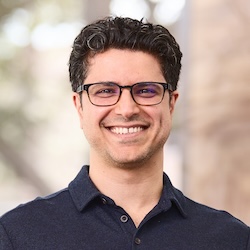
The Department of Biochemistry & Molecular Genetics presents:
Hani Goodarzi, PhD
Core Investigator at Arc Institute
Associate Professor, Department of Biochemistry and Biophysics
University of California San Francisco
Presentation:
"Mosaics, Atlases, and AI: Charting New Paths in Precision
Oncology"
Abstract:
Precision oncology faces significant challenges due to the
inherent heterogeneity and complexity of tumor biology. Traditional drug
screening methods lack the scalability and context required to
accurately predict clinical outcomes. This talk highlights three
innovative approaches addressing these critical challenges: GENEVA,
Tahoe-100M, and scBaseCamp. First, GENEVA (Genetically Diverse and
Endogenously Controlled Phenotypic Variation Assay) enables scalable and
barcode-free phenotypic profiling, capturing intra- and inter-tumor
heterogeneity within patient-derived models. Second, Tahoe-100M
represents a groundbreaking giga-scale single-cell perturbation atlas,
encompassing over 100 million cells treated with diverse drug
combinations, providing unprecedented insight into cellular responses
and drug mechanisms. Finally, scBaseCamp introduces AI-driven data
curation, creating an expansive, uniformly processed repository of
single-cell data that fuels robust computational modeling and
reproducibility. Together, these platforms represent a powerful
integrative framework, advancing our understanding of tumor biology and
enhancing precision therapeutic strategies through data-driven insights
and scalable AI technologies.
Host: Dr. Saeid Parast, Post-Doctoral Fellow, Biochemistry and Molecular Genetics, Shilatifard Lab
Time
Thursday, May 8, 2025 at 10:00 AM - 11:00 AM
Location
Simpson Querrey Auditorium, Simpson Querrey Biomedical Research Center Map
Contact
Calendar
Biochemistry & Molecular Genetics Seminar Series
Generative AI for Language Instruction: Copilot for Student Assignments
Language Resource Center
3:00 PM
//
2530, Kresge Hall
Details

The Media and Design Studio and Language Resource Center are pleased to offer a hands-on workshop on the use of Microsoft Copilot. This workshop expands on examples presented in a fall quarter seminar series by allowing participants to directly interact with various recommended generative artificial intelligence ("Gen AI") tools.
Participants will learn how to use AI to develop lesson plans and materials and to create and shape various forms of multimedia for teaching use.
Time
Thursday, May 8, 2025 at 3:00 PM - 4:00 PM
Location
2530, Kresge Hall Map
Contact
Calendar
Language Resource Center
SLIPPAGE: 2025 3D Humanities Series
SLIPPAGE: Performance | Culture | Technology
5:00 PM
//
226, John J. Louis Hall
Details

The Slippage: 3D Humanities Series aims to nurture the formation of an interdisciplinary learning community that critically engages the connections between performance, history, theater, and emerging technologies. The 3-part performance and workshop series is designed to expose Northwestern University audiences to professional artists with technology-enhanced practices, and to provide participants with the skills and on-campus resources that enable innovative humanities research. Each event will pair a performance and discussion led by a technology-focused professional performance artist, with a hands-on skills-based workshop led by Northwestern University faculty or staff. The workshops will allow participants to engage technologies such as: motion capture, 3D digitization and printing, artificial intelligence and mechatronics – merging technological skill sets with critical discussions around artistry, humanity, and social possibilities.
Artists:
April 16 - Ben Baker, Assistant Professor of Philosophy at Colby College
April 30- Eto Otitigbe, Assistant Professor of Art at Brooklyn College
May 14- LaJuné McMillian, Multidisciplinary Artist and Educator
Join us from 5:00-7:00PM on any or all of the dates for these innovative programs:
Introduction: 5:00 - 5:10PM
Presentation: 5:10 - 5:30PM
Moderated Q&A: 5:30 - 5:50PM
Break: 5:50 - 6:00PM
Workshop: 6:00 - 7:00PM
Group Reflection: 7:00 - 7:30PM
Reception 7:30-8:30PM
Workshop Leaders: Thomas F. DeFrantz, Ted Quiballo, Craig Stevens, Michael A. Peshkin, Nick Marchuk, Darren Gergle
Series Convenors: Thomas F. DeFrantz (SLIPPAGE Lab/Performance Studies), Craig Stevens (Northwestern IT: Media & Technology Innovation/Anthropology), Ted Quiballo (Northwestern Libraries)
Sponsors: The Alice Kaplan Institute for the Humanities; The Alumnae of Northwestern University; Northwestern Libraries; Northwestern Depts. of IT and Performance Studies; and SLIPPAGE Lab.
Time
Wednesday, May 14, 2025 at 5:00 PM - 8:30 PM
Location
226, John J. Louis Hall Map
Contact
Calendar
SLIPPAGE: Performance | Culture | Technology
NITMB Seminar Series: David Freedman
NSF-Simons National Institute for Theory and Mathematics in Biology
10:00 AM
//
Suite 4010
Details
David Freedman is the Chair of Neurobiology and the Stahl Professor of Neurobiology in the Wallman Society of Fellows of Neurobiology at the University of Chicago.
Research summary: Through experience, we learn to interpret the sights and sounds around us and to make decisions that move us closer to achieving our goals. Our ability to learn from and adapt to our ever changing environment is a foundation of complex behavior, as it allows us to make sense of incoming sensory stimuli and to plan successful actions. To study these questions, our laboratory uses advanced neurophysiological and behavioral techniques, in parallel with machine learning approaches for studying cognitive computations in artificial neural networks. Together, our work is providing insights into the brain mechanisms of visual learning, recognition and decision making.
Learn more about David Freedman's research
The NSF-Simons National Institute for Theory and Mathematics in Biology Seminar Series aims to bring together a mix of mathematicians and biologists to foster discussion and collaboration between the two fields. The seminar series will take place on Fridays from 10am - 11am at the NITMB offices in the John Hancock Center in downtown Chicago. There will be both an in-person and virtual component.
Time
Friday, May 16, 2025 at 10:00 AM - 11:00 AM
Location
Suite 4010
Contact
Calendar
NSF-Simons National Institute for Theory and Mathematics in Biology
Northwestern Medicine Healthcare AI Forum
I.AIM - Institute for Augmented Intelligence in Medicine
10:00 AM
Details
May 16th speaker is TBD
Welcome to the Northwestern Medicine Healthcare AI Forum, where we dive into cutting-edge developments in the field of AI for healthcare. We present the latest published research and technology innovation, and facilitate open discussion among attendees.
Open to Northwestern Medicine professionals and the broader research and patient community within Northwestern University and the Greater Chicago area, our mission is to establish a thriving healthcare AI ecosystem that fosters collaboration and supports a network of dedicated scholars and professionals. We are here to promote research, innovation, and leadership while facilitating the seamless translation of AI advancements into the realm of biomedicine.
To ensure our forum delivers the most pertinent insights into AI's application across various aspects of healthcare, we have assembled a distinguished advisory board. This board comprises esteemed faculty from the fields of medicine, engineering, art and science, as well as senior leaders of the healthcare system. The advisory board is chaired by Prof. Yuan Luo, Chief AI Officer at I.AIM and Northwestern University Clinical and Translational Sciences Institute (NUCATS).
Join us in shaping the future of healthcare through the power of artificial intelligence, as we foster a vibrant community of scholars, patients, professionals and leaders dedicated to driving innovation in this critical field.
Meetings take place remotely via Zoom on the third Friday of each month, 10-11am CT.
Time
Friday, May 16, 2025 at 10:00 AM - 11:00 AM
Contact
Calendar
I.AIM - Institute for Augmented Intelligence in Medicine
Statistics and Data Science Seminar: "Data Augmentation for Graph Regression"
Department of Statistics and Data Science
11:00 AM
//
Ruan Conference Room – lower level, Chambers Hall
Details
Data Augmentation for Graph Regression
Meng Jiang, Associate Professor, Department of Computer Science and Engineering, University of Notre Dame
Abstract: Graph regression plays a key role in materials discovery by enabling the prediction of numerical properties of molecules and polymers. However, graph regression models often rely on training sets with only a few hundred labeled examples, and these labels are typically imbalanced. While a large number of unlabeled examples are available, they are often drawn from diverse domains, making them less effective for improving target label predictions. In machine learning, data augmentation refers to techniques that increase the size of the training set by generating slightly modified or synthetic versions of existing data. These methods are simple yet effective. In this talk, I will introduce three graph data augmentation techniques tailored for supervised learning, imbalanced learning, and transfer learning in graph regression tasks. The first technique leverages the mutual enhancement between model rationalization and data augmentation, improving both accuracy and interpretability in molecular and polymer property prediction. This approach demonstrates that graph data augmentation can be effectively performed in latent spaces. The second technique generates representations of additional data points with underrepresented labels to balance the training set. The third technique introduces a graph diffusion transformer (Graph DiT) that facilitates data-centric transfer learning, addressing the limitations of self-supervised methods when dealing with unlabeled graph data. Graph DiT integrates multiple properties such as synthetic score and gas permeability as condition constraints into diffusion models for multi-conditional polymer generation. Lastly we will discuss foundation model approaches for materials discovery.
Time
Friday, May 23, 2025 at 11:00 AM - 12:00 PM
Location
Ruan Conference Room – lower level, Chambers Hall Map
Contact
Calendar
Department of Statistics and Data Science
